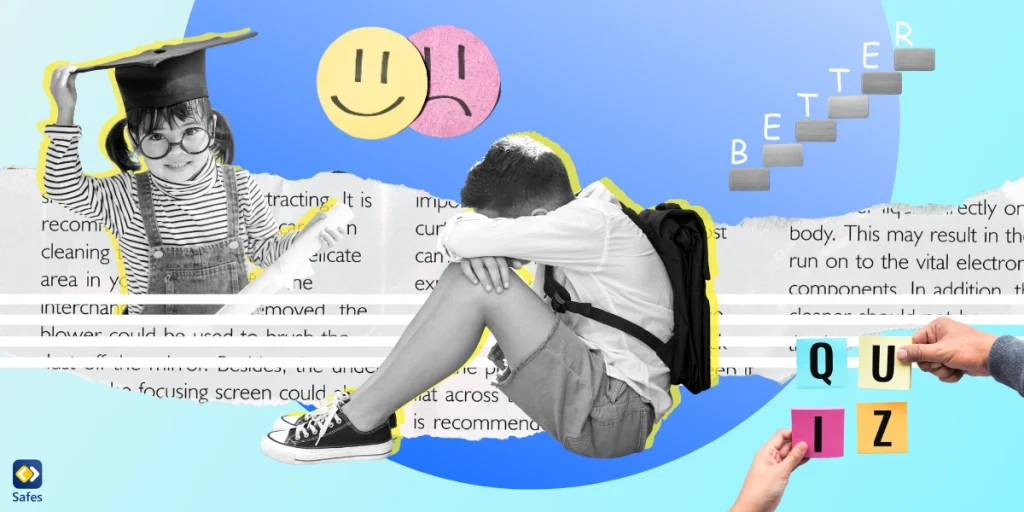Academic pressure is a widespread problem that affects students worldwide, casting a shadow on their educational path. When the quest for academic success grows increasingly difficult, the toll on students’ well-being often goes unnoticed. In this blog post, we will dig into the various layers of academic stress, investigating its causes, repercussions, coping mechanisms, and preventative and mitigation measures.
Download and Start Your Free Trial of the Safes Parental Control App
Sources of Academic Pressure
Here are some of the most important sources of academic pressure on students.
Parental Expectations
Inadvertently, parents’ hopes for their children’s success might add to excessive academic pressure. Knowing and managing these expectations is critical for a positive student-parent relationship.
Peer Competition
Students sometimes find themselves in an unconscious race for intellectual mastery in the competitive world of education. Peer comparison can exacerbate stress and impede collaborative learning situations.
Educational System Demands
Students might experience tremendous stress as a result of the educational system’s framework, which includes severe grading, large workloads, and standardized testing. Fixing structural challenges is critical to creating a more welcoming learning environment.
Self-Imposed Pressure
Students may establish unreasonable goals for themselves due to personal drives and desires. Understanding the value of balance and self-compassion is critical for relieving self-imposed strain.
Social Comparison
Students are frequently exposed to edited versions of their classmates’ successes in the age of social media, which adds to the pressure to succeed. In this day and age of digital connectedness, it is critical to promote a healthy attitude.

Consequences of Academic Pressure
There’s a relationship between academic pressure and mental health in children that should be managed wisely, otherwise the consequences will be the following:
Stress and Anxiety
Constant academic pressure can lead to increased stress and worry, affecting both mental and emotional well-being.
Depression
Untreated stress can lead to more serious mental health problems, such as depression. Recognizing the link between academic strain and mental health is critical.
Physical Health Effects
Persistent stress can have physical manifestations, impacting sleep habits, eating, and general health. Recognizing the interdependence of mental and physical well-being is essential for providing comprehensive student care.
Burnout
Extended academic strain without proper support can result in burnout, which is characterized by emotional tiredness and a sense of detachment from one’s academic activities.
Impact on Social Life
Academic expectations can put a burden on students’ social life, impeding the development of important interpersonal skills and helpful social networks.

Coping Mechanisms
Some students use coping mechanisms to deal with academic pressure.
Time Management
Students can integrate academic commitments with other elements of their lives by implementing good time management practices.
Setting Realistic Goals
Encourage pupils to create attainable objectives to foster a healthy approach to achievement and reduce the danger of burnout.
Seeking Support
Maintaining emotional well-being requires open communication channels and seeking help from friends, family, or mental health specialists.
Mindfulness and Stress Reduction
Academic stress may be considerably reduced by incorporating mindfulness methods and stress reduction exercises into everyday routines.
Balancing Academic and Extracurricular Activities
Promoting a healthy mix between academics and extracurricular activities promotes a more complete and enjoyable student experience.
Prevention and Mitigation
Here are some methods parents can use to prevent and mitigate academic pressure on their child.
Promoting a Supportive Learning Environment
Educational institutions should prioritize developing a helpful and nurturing learning atmosphere that prioritizes students’ well-being over academic results.
Educating About Stress Management
Stress management education programs provide students with the tools they need to face academic hurdles.
Parental Involvement and Communication
Promoting open communication among parents, educators, and students is critical for managing and alleviating academic stress.
Encouraging a Growth Mindset
Developing a growth mindset allows pupils to see problems as chances for progress, lowering their fear of failure and the stress that comes with it.

Parental Controls and Academic Pressure
Parental control apps can be valuable tools for managing academic pressure by promoting a healthy balance between screen time, academics, and leisure activities. Here are some ways you can use parental control apps to decrease academic pressure:
-
Set Time Limits
Set time limitations for educational applications and websites on a daily or weekly basis. This discourages overuse and ensures that students have time set aside for other activities such as physical activity, hobbies, or social connections.
-
Create a Balanced Schedule
Make use of the scheduling capabilities to construct a well-rounded schedule that incorporates study periods, breaks, extracurricular activities, and relaxation. A well-balanced timetable encourages a healthy lifestyle and aids in the management of academic stress.
-
Block Access During Study Hours
To reduce distractions, you can temporarily ban access to non-educational apps and websites during allocated study hours. This can help to establish a concentrated environment for learning without the distractions of social media or other forms of entertainment.
-
Monitor Online Activity
Keep a watch on your child’s internet behavior to make sure they aren’t using social media excessively or accessing inappropriate stuff. Monitoring enables you to handle any problems as they arise and assist them toward a more productive online experience.
-
Encourage Breaks and Downtime
Make aside time for breaks and leisure. To avoid burnout, students should take frequent pauses. Employ parental control applications to remind you to take brief breaks or to encourage physical activity during study sessions.
-
Reward System
Create an incentive system in which kids receive extra screen time or other benefits for reaching academic goals. Positive reinforcement can help students focus on their schoolwork.
-
Educational Content Filters
Use content filters to guarantee that your child is exposed to educational and age-appropriate web information. This can aid in the maintenance of a positive online learning environment.
-
Communication and Collaboration
Several parental control applications have features that make communication between parents and children easier. Utilize these tools to discuss academic goals, resolve problems, and cooperate on workload and stress management measures.
-
Sleep Mode
Activate a sleep mode option that blocks device access during sleep. Adequate sleep is necessary for academic achievement and overall well-being, therefore maintaining a good sleep pattern is critical.
-
Encourage Offline Activities
Employ parental control applications to remind you to do things like read physical books, pursue hobbies, or spend time with family and friends. Encouragement of a healthy offline life leads to a more balanced existence.
You can use the parental controls on your child’s device such as Windows parental controls or the parental controls on Android. A better option is using a third-party parental control app like Safes, which can be used to implement all the changes mentioned above and more. Also, Safes is available across multiple platforms including iOS and Android. You can sign up for our free trial to experience enhanced parental control without any commitment!
Conclusion
To summarize, the hidden cost of academic pressure on students is a complicated issue that requires collective attention and action. We can develop an educational landscape that promotes students’ overall well-being by understanding the causes and effects and applying appropriate coping mechanisms, preventive, and mitigation methods. It’s time to raise the curtain on academic stress and work toward a future in which success is defined not just by academic accomplishments but also by the well-being of those who strive for it. Let us begin on a communal journey toward a healthier and more compassionate approach to education.
Your Child’s Online Safety Starts Here
Every parent today needs a solution to manage screen time and keep their child safe online.
Without the right tools, digital risks and excessive screen time can impact children's well-being. Safes helps parents set healthy boundaries, monitor activity, and protect kids from online dangers—all with an easy-to-use app.
Take control of your child’s digital world. Learn more about Safes or download the app to start your free trial today!




